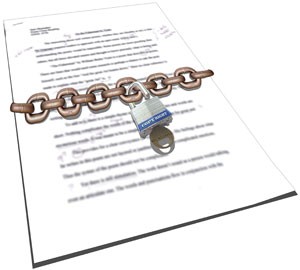A federal district court judge in Virginia threw out a lawsuit against the online plagiarism detection service Turnitin.com last month, ruling the Web site does not violate copyright laws.
Nonetheless, some UA students believe the service deceives them into giving up the ability to use their own work.
Rebecca Rodl, a political science senior, has had to submit her papers to Turnitin for her Africana studies class this semester. She takes issue with the user agreement students must comply with if their professors utilize the site for grading.
“”There’s a part of it that says the submitter of the paper is essentially giving up all copyrights to their papers and that (site creator) iParadigm is databasing and selling the paper,”” she said. “”Not using it for creative profit, but selling the database to the (contracting) universities for profit. In my opinion, if anyone is going to make a profit off of anything I write, it’s going to be me.””
Turnitin allows teachers to compare students’ work against more than 22 million online submissions and Internet sources, ensuring that assignments are not too similar or identical to any other published works.
More than 125,000 works are submitted to the site daily, and the site is used by more than 8,400 schools in 103 countries, according to the Tufts Daily.
Virginia high school students at the source of the federal ruling were just a few of the many students who have come up against the site in the past year, claiming that it violates their intellectual property rights and copyright laws.
The Dean of Students Office has not received any complaints about the site, said program coordinator Anthony Skevakis, but the ruling will definitely “”silence a lot of components that are against this.””
The user agreement states: “”You grant iParadigms a non-exclusive, royalty-free, perpetual, world-wide, irrevocable license to reproduce, transmit, display, disclose, archive and otherwise use Your Communications on the Site or elsewhere for our business purposes. iParadigms is free to use any ideas, concepts, techniques, know-how or information in Your Communications for any purpose, including, but not limited to, the development and use of products and services based on the Communications. This license does not include any right to use ideas set forth in papers submitted to the site.””
Rodl wants students to be aware of the license agreement and what it entails.
“”It’s really hard for our technological generation, because usually you’ll just check ‘yes’,”” she said.
Thomas A. Behrendt, a Tempe patent attorney working with copyright cases, says that the only way students could win a copyright infringement suit against the site would be if they had registered a copyright for their work.
“”As soon as student puts pen to paper it’s copyrighted, but there’s a huge divide between having a copyright and a registered copyright,”” he said. “”Unless you register the copyright within 90 days after any infringements occur, you won’t have a case and Turnitin.com will have unfettered access to the work.””
Generally speaking, copyright infringement awards damages based on the number or instances of infringement. Behrendt used music file sharing as an example – the people with the most infringements are the ones who are sued, and they’re sued for each song individually.
“”If Turnitin.com was sued, it would be up in the millions of dollars,”” he said. “”But I think it’s very unlikely that you’d have that many students registering their copyrights preemptively.””
A main concern of UA students is that if they ever wanted to expound on a former paper for another class, or include a portion in their thesis, they would be cited for plagiarism.
“”If you’re writing huge papers that can be turned into thesis papers later, it’s going to get in the way,”” said Austin Lugo, an engineering sophomore.
Professors have discretion whether it is appropriate to use the site, based on the subject at hand. Lugo said he had his own run-in with the site when he was asked to turn in a lab report.
Because he and his lab partner had the same information, they were both accused of plagiarism.
“”It’s kind of pointless, because for a lab everything will be the same for every student,”” Lugo said.
Some students argue that using the site to screen for plagiarism takes a toll on the student-instructor relationship. Professors see it differently.
“”I have two sections and 600 students total, and they all have to write a 10-page paper,”” said James McBrearty, an economics professor. “”If I didn’t have Turnitin.com, there’s no way we could check the accuracy of 600 papers for plagiarism and all that kind of stuff. Without that resource it would be physically impossible to do that.””
Just by knowing their paper will be checked by the site, students are forced to think twice about plagiarizing, he said.
He said the site helps when dealing with freshmen, many of whom haven’t written much of a paper before, by preparing them for writing in upper-division classes.
“”It puts the fear of God in them, and they will take the time to write something in their own words,”” he said. “”I would be lost without it and would probably have many more instances of plagiarism.””
Sean Perl, an equine management senior, began using Turnitin.com this semester. “”I can undoubtedly say that the convenience of submitting papers electronically from anywhere is a plus,”” he said.
“”As long as I get the paper in and get the grade, that’s all I care about,”” he said.









